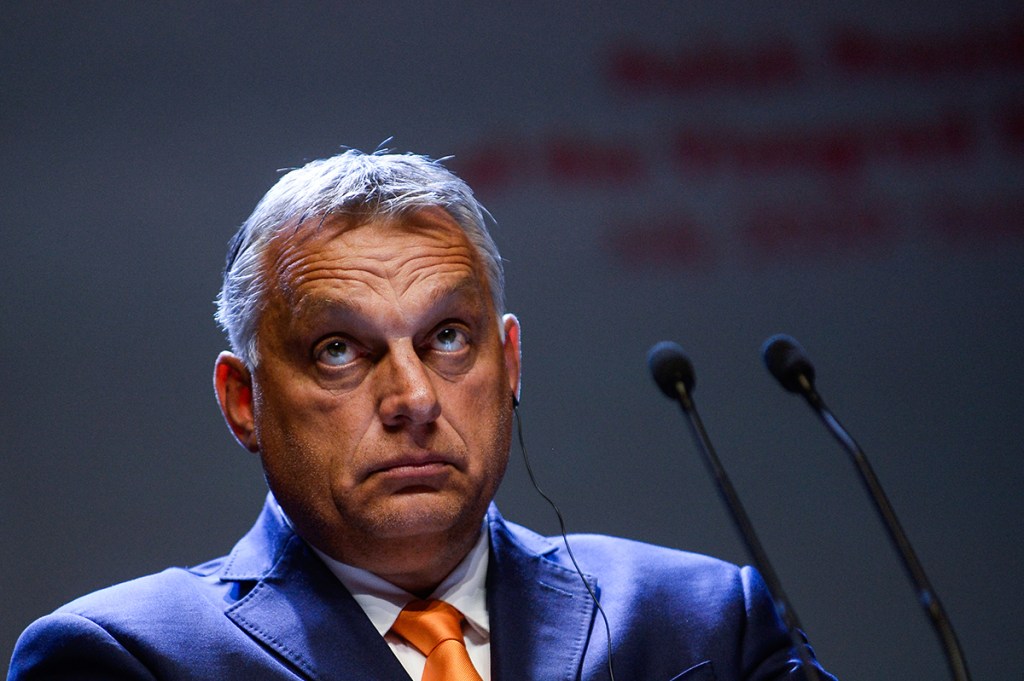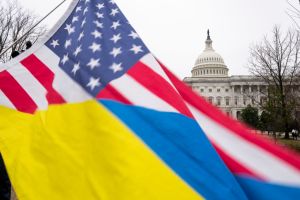On a nondescript bridge in the northeastern Hungarian town of Záhony, the European Union ends and the war begins. Even amid the turmoil in Ukraine, the local border crossing is strangely quiescent. The flood of cars from the early days of the war has slowed to a trickle, and big eighteen-wheelers continue to cross over from Hungary into Ukraine. There are only two signs that something is amiss: a small notice on the door of the nearby Penny Market asking customers to help Ukrainian refugees, and a massive billboard of Hungarian prime minister Viktor Orbán’s stern face, promising voters that he will keep Hungary safe and peaceful.
The war in Ukraine threatens to upend Orbán’s carefully-orchestrated reelection campaign, raising energy costs, injecting turbulence into an already troubled economy and highlighting the Hungarian prime minister’s ties to Vladimir Putin. A cursory survey of political billboards in Budapest gives you a sense of how awkward the war has been for Hungary’s ruling Fidesz party. Older signs harp on domestic culture-war issues, from accusing the opposition of flooding schools with sexual propaganda to being a tool of Ferenc Gyurcsány, Orbán’s unpopular predecessor. The latest billboards promise to keep Hungary out of a war that has suddenly erupted on its eastern frontier.
Aside from a few campaign signs for Orbán and Péter Márki-Zay, the head of the opposition coalition, the Hungarian election feels like a distant concern in Záhony. Cars no longer flood the highway checkpoint, but trains still arrive regularly at the local railway station with Ukrainian refugees. Several humanitarian organizations have set up shop at the station, from the United Nations High Commissioner for Refugees to the International Red Cross to the World Central Kitchen.
A town with one hotel and less than 5,000 residents is suddenly playing host to a sizable international contingent. Japanese journalists and Red Cross employees are the only ones still wearing masks — the fighting across the border has displaced Covid as the most pressing issue for most people. There is even a homemade sign announcing the presence of an India-Hungarian Humanitarian Task Force. I overheard a few heavily accented “bocsánats” (Hungarian for “sorry”) at the Záhony ticket office as a trio of Indians made their way through the crowd of aid workers, police and recent arrivals.
The number of international refugees fleeing the fighting is one surprising feature of the Russia-Ukraine war. Tibor Eszenyi, a relief coordinator with the Magyar Református Szeretetszolgálat, a religious organization that provides shelter and hot food, has been working at the station since the early days of the conflict. He says that during the first two weeks, many refugees were medical and engineering students from India, Nigeria and Morocco who attend Ukrainian universities. He’s also met people from as far afield as China, Egypt and the Congo. Most of the Ukrainian arrivals are from cities in the east like Mariupol and Kharkiv, places that have been hit hardest by recent fighting.
Eastern Europe has always been a surprisingly cosmopolitan place. Eszenyi introduced Kateryna (she preferred to not give her last name), a Ukrainian from Kyiv who has a Russian grandfather and is more comfortable speaking Russian than Ukrainian. She is traveling by train to her aunt in Slovenia, but she hopes to return home after the war is over to finish her degree in event management. Kateryna’s story is translated by Réka, another aid worker with the Reformatus relief agency. Réka is ethnically Hungarian and studies at a Budapest university, but her family comes from the nearby Ukrainian city of Mukachevo (Munkács to the Hungarians). She is currently in high demand because she speaks Hungarian, Russian and Ukrainian.
The train ride back to Budapest is filled with snatches of Ukrainian conversation, bottled water and stale junk food, necessities for a long rail journey with no restaurant cars or dining services. Kateryna Kanyuk, another refugee from Kyiv, has been on and around trains for the past twenty-four hours. Her family is still in Kyiv but she decided to leave, not because of the bombing, she says, but because life had become intolerably boring under mandatory curfews and other wartime restrictions. She casually adds that she didn’t mind spending nights in bomb shelters because the total darkness made it easy to fall asleep.
With her black Tommy Hilfiger sweatshirt, modern smartphone and fluent English, Kanyuk could be just another backpacker on a long train ride. She’s traveling to Vienna to stay with her brother. Like every Ukrainian I’ve spoken to, she plans to return home after the war is over.
Back in Budapest, the fighting seems very far away. At the Nyugati (Western) and Keleti (Eastern) Railway Stations, aid organizations offer translation services, hot food and drinks and makeshift play areas for young children. Provided they register at border checkpoints like Záhony, the Hungarian government is offering a solidarity rail pass to Ukrainian refugees, which gives them free transportation across Hungary and on to Western Europe.
In the city, signs at shops and cafes express support for Ukraine. Several days earlier, at the Budapest Museum of Fine Arts, three Ukrainians politely asked me for help deciphering ticket prices. A few pro-Orbán billboards have been defaced with graffiti mocking his past overtures to Putin. Aside from these minor intrusions, life goes on.
The war may be distant, but the political implications for Hungary are very real. On April 3, Hungarian voters go to the polls to decide Orbán’s future. Although Fidesz faces an awkward coalition that agrees on very little except the urgency of replacing Orbán, the war has added to Hungary’s post-Covid economic woes and highlighted tensions within the ruling party’s own ranks.
Orbán has made his political reputation as an assertive nationalist, vocally celebrating Hungary’s historic identity and political sovereignty, including its long struggles against foreign invaders. The landmark Budapest statue of Sándor Petőfi, a Hungarian poet and Lord Byron-like figure who died fighting for national independence, is still garlanded with flags and wreaths from the recent March 15 national holiday. Petőfi, incidentally, was killed fighting the Russians.
Orbán’s political history makes the Ukraine crisis particularly awkward. The Hungarian prime minister has opportunistically sought closer ties with Putin and criticized Ukrainian language and education policies for ethnic minorities, including the sizable Hungarian community in southeastern Ukraine. Réka, the multilingual translator at the Záhony railway station, is one of these Hungarians. Before the war, their status was a persistent thorn in the side of Ukraine-Hungary relations.
In some ways, Orbán has been unfairly singled out for his relationship with Putin. Before the invasion of Ukraine, Boris Johnson enthusiastically welcomed Russian oligarchs to “Londongrad” while Germany’s leadership class eagerly pursued rapprochement with Moscow. There are few European politicians who can boast of persistent Putin skepticism, but Orbán’s vocal conservatism and reputation for courting autocrats make him especially vulnerable in the current climate.
For years, Orbán and Fidesz have benefited from favorable political conditions, from a strong Hungarian economy to a fractious and divided opposition. Now the Hungarian prime minister leads a country buffeted by Covid, inflation and war, as well as a united coalition poised to take advantage of his political weakness.
Critics often claim that Orbán is a budding autocrat, but the Ukraine crisis has revealed just how weak his hold on power really is. On April 3, his recent dominance of the Hungarian political scene will be put to a final test.


















